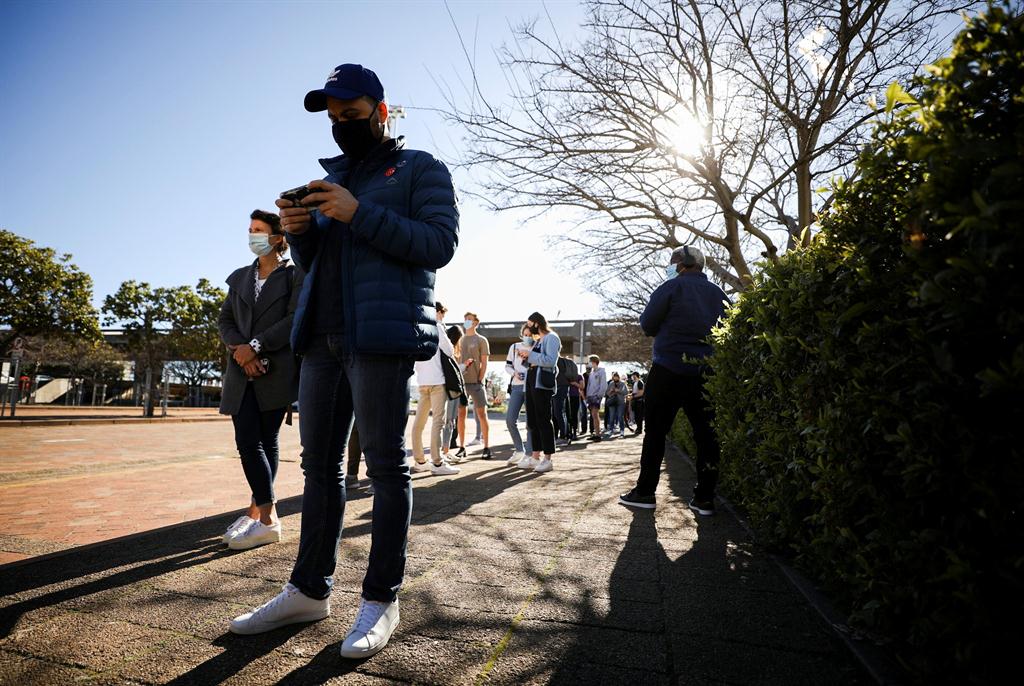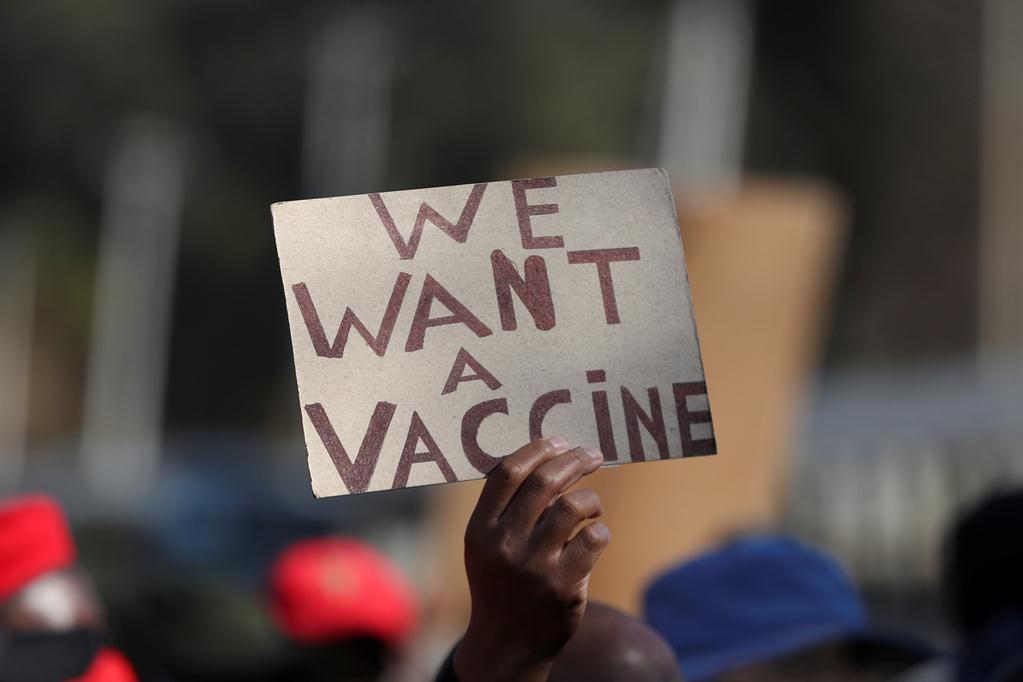SA considering compulsory Covid-19 jabs
Only a quarter of South Africans are fully vaccinated against Covid-19 despite a sufficient supply of doses.
PROMIT MUKHERJEE AND TIM COCKS
South African President Cyril Ramaphosa said on Sunday that authorities were considering making Covid-19 shots compulsory for certain places and activities, as a rise in infections linked to a new variant threatens to become a fourth wave.
Only a quarter of South Africans are fully vaccinated against Covid-19 despite a sufficient supply of doses, owing partly to logistical problems getting them out to rural areas, but also to vaccine hesitancy and apathy among the population.
Kenya's government last week issued a directive that residents must show proof of vaccination by Dec. 21 to access services, making it one of the first countries in Africa to issue a vaccine mandate.
"We have been undertaking engagements with social partners and other stakeholders on introducing measures that make vaccination a condition for access to workplaces, public events, public transport and public establishments," Ramaphosa said in an address to the nation.
If the country does not consider the option of a vaccine mandate, it will "continue to be vulnerable to new variants and will continue to suffer new waves of infection", he said, adding that vulnerable people might also be offered booster shots.
But he said authorities would not be considering lockdown restrictions in Africa's most industrialised country for the time being.
Separately, Zambia's health minister Sylvia Maseko said the southern African nation would require public servants to be vaccinated to come to work, and that anyone seeking access to a government building will need to prove they have had the jab.
Travel ban
Passengers wait to board international flights, amidst the spread of the new SARS-CoV-2 variant Omicron, at O.R. Tambo International Airport in Johannesburg, South Africa, November 28, 2021.
International check-in counters stand empty as several airlines stopped flying out of South Africa, amidst the spread of the new SARS-CoV-2 variant Omicron, at O.R. Tambo International Airport in Johannesburg, South Africa, November 28, 2021.
A healthcare worker collects a swab from a passenger for a PCR test against the coronavirus disease before traveling to Uganda, amidst the spread of the new SARS-CoV-2 variant Omicron, at O.R. Tambo International Airport in Johannesburg, South Africa, November 28, 2021.
International check-in counters stand empty as several airlines stopped flying out of South Africa, amidst the spread of the new SARS-CoV-2 variant Omicron, at O.R. Tambo International Airport in Johannesburg, South Africa, November 28, 2021.
South Africa has seen a near-tripling of daily reported cases in the past week, mainly of the new Omicron variant first identified by South African virologists.
"If cases continue to climb, we can expect to enter a fourth wave of infections within the next few weeks, if not sooner," Ramaphosa warned.
Scientists
Scientists have so far detected relatively few cases of the Omicron variant, mainly in South Africa but also in Botswana, Hong Kong and Israel. But they are worried by its high number of mutations, which have raised concerns that it could be more vaccine-resistant and transmissible.
A doctor who was amongst the first in the country to flag the possibility of a new variant said on Sunday however that its symptoms so far appeared to be mild and treatable at home.
South African officials are furious about a British ban on flights from southern African countries, which several other countries have copied. Many South Africans feel they are being punished for their transparency and hard work in keeping tabs on the way the virus is mutating.
In Sunday's address, the president slammed rich Western countries for their knee-jerk imposition of travel bans and urged them to reverse the actions.
"This is a clear and completely unjustified departure from the commitment that many of these countries made at the meeting of G20 countries in Rome last month," Ramaphosa said.
"The prohibition of travel is not informed by science, nor will it be effective in preventing the spread of this variant."-Nampa/Reuters
South African President Cyril Ramaphosa said on Sunday that authorities were considering making Covid-19 shots compulsory for certain places and activities, as a rise in infections linked to a new variant threatens to become a fourth wave.
Only a quarter of South Africans are fully vaccinated against Covid-19 despite a sufficient supply of doses, owing partly to logistical problems getting them out to rural areas, but also to vaccine hesitancy and apathy among the population.
Kenya's government last week issued a directive that residents must show proof of vaccination by Dec. 21 to access services, making it one of the first countries in Africa to issue a vaccine mandate.
"We have been undertaking engagements with social partners and other stakeholders on introducing measures that make vaccination a condition for access to workplaces, public events, public transport and public establishments," Ramaphosa said in an address to the nation.
If the country does not consider the option of a vaccine mandate, it will "continue to be vulnerable to new variants and will continue to suffer new waves of infection", he said, adding that vulnerable people might also be offered booster shots.
But he said authorities would not be considering lockdown restrictions in Africa's most industrialised country for the time being.
Separately, Zambia's health minister Sylvia Maseko said the southern African nation would require public servants to be vaccinated to come to work, and that anyone seeking access to a government building will need to prove they have had the jab.
Travel ban
Passengers wait to board international flights, amidst the spread of the new SARS-CoV-2 variant Omicron, at O.R. Tambo International Airport in Johannesburg, South Africa, November 28, 2021.
International check-in counters stand empty as several airlines stopped flying out of South Africa, amidst the spread of the new SARS-CoV-2 variant Omicron, at O.R. Tambo International Airport in Johannesburg, South Africa, November 28, 2021.
A healthcare worker collects a swab from a passenger for a PCR test against the coronavirus disease before traveling to Uganda, amidst the spread of the new SARS-CoV-2 variant Omicron, at O.R. Tambo International Airport in Johannesburg, South Africa, November 28, 2021.
International check-in counters stand empty as several airlines stopped flying out of South Africa, amidst the spread of the new SARS-CoV-2 variant Omicron, at O.R. Tambo International Airport in Johannesburg, South Africa, November 28, 2021.
South Africa has seen a near-tripling of daily reported cases in the past week, mainly of the new Omicron variant first identified by South African virologists.
"If cases continue to climb, we can expect to enter a fourth wave of infections within the next few weeks, if not sooner," Ramaphosa warned.
Scientists
Scientists have so far detected relatively few cases of the Omicron variant, mainly in South Africa but also in Botswana, Hong Kong and Israel. But they are worried by its high number of mutations, which have raised concerns that it could be more vaccine-resistant and transmissible.
A doctor who was amongst the first in the country to flag the possibility of a new variant said on Sunday however that its symptoms so far appeared to be mild and treatable at home.
South African officials are furious about a British ban on flights from southern African countries, which several other countries have copied. Many South Africans feel they are being punished for their transparency and hard work in keeping tabs on the way the virus is mutating.
In Sunday's address, the president slammed rich Western countries for their knee-jerk imposition of travel bans and urged them to reverse the actions.
"This is a clear and completely unjustified departure from the commitment that many of these countries made at the meeting of G20 countries in Rome last month," Ramaphosa said.
"The prohibition of travel is not informed by science, nor will it be effective in preventing the spread of this variant."-Nampa/Reuters







Comments
Namibian Sun
No comments have been left on this article